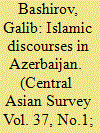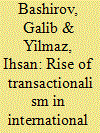|
|
|
Sort Order |
|
|
|
Items / Page
|
|
|
|
|
|
|
| Srl | Item |
| 1 |
ID:
170610


|
|
|
|
|
| Summary/Abstract |
Since the 1990s, US policy in Azerbaijan has gone through several important shifts in the areas of energy, security and democracy promotion. How can we make sense of these decisive shifts in the orientation of US policy? In this paper, I identify major shifts in US policy in Azerbaijan based on relative weight given to energy, security and democracy issues. I divide US policy into four different time periods: 1994 to 2001, 2001 to 2007, 2007 to 2015 and 2015 to present. I analyze the changes that took place in US policy in the dimensions of energy, security and democracy. Then, I provide plausible explanations that can account for shifts in US policy. To do so, I utilize foreign policy analysis theory that focuses on domestic and international parameters that bring major foreign policy shifts. My explanation is not monocausal, and focuses on several factors that have influenced US policy in Azerbaijan.
|
|
|
|
|
|
|
|
|
|
|
|
|
|
|
|
| 2 |
ID:
159215


|
|
|
|
|
| Summary/Abstract |
This article captures the dynamics of the securitization process through which new Islamic movements were constructed as an existential threat in Azerbaijan. After mapping out various competing discourses on Islam that emerged in the post-independence period, I discuss, using insights from the post-structuralist approach to securitization theory, the process of securitization of these movements. First I discuss the construction, by the hegemonic discourses, of a uniform identity category of ‘non-traditional religious movements’, and representation of otherwise different religious groups and organizations within this much stigmatized category. Later I show how the movements were constituted as an existential threat to national security and national identity through forging chains of associations between these groups and instability, chaos, social degeneration and terror. In the final section, I show how the securitizing discourse found expressions in emergency measures that were designed to deal with the movements and confirm their identity as dangerous other.
|
|
|
|
|
|
|
|
|
|
|
|
|
|
|
|
| 3 |
ID:
176233


|
|
|
|
|
| Summary/Abstract |
This paper's main objective is to explain the concept of transactionalist foreign policy in detail and to demonstrate how it applies to a real-world case in Turkish foreign policy towards the EU under the AKP rule. We define transactionalism as a foreign policy approach that favours bilateral to multilateral relations, focuses on short-term wins rather than longer-term strategic foresight, adheres to a zero-sum worldview where all gains are relative and reciprocity is absent, rejects value-based policymaking, and does not follow a grand strategy. This paper also provides a new layer to the existing periodisation of AKP's EU policy through framing the EU as ‘a foreign policy actor’ in Turkey-EU relations. Scholars divide Turkey's EU policy under the AKP government into three broad periods: Europeanisation, selective Europeanisation and De-Europeanisation. We complement this literature by adding another layer of analysis that focuses on Turkey's foreign relations in its broader region, including the EU, and argue that Turkey's relations with the EU were characterised by the zero-problems doctrine during the selective Europeanisation period, and by civilisational competition with the EU during the de-Europeanisation period, and by transactionalism since 2016.
|
|
|
|
|
|
|
|
|
|
|
|
|
|
|
|
|
|
|
|
|